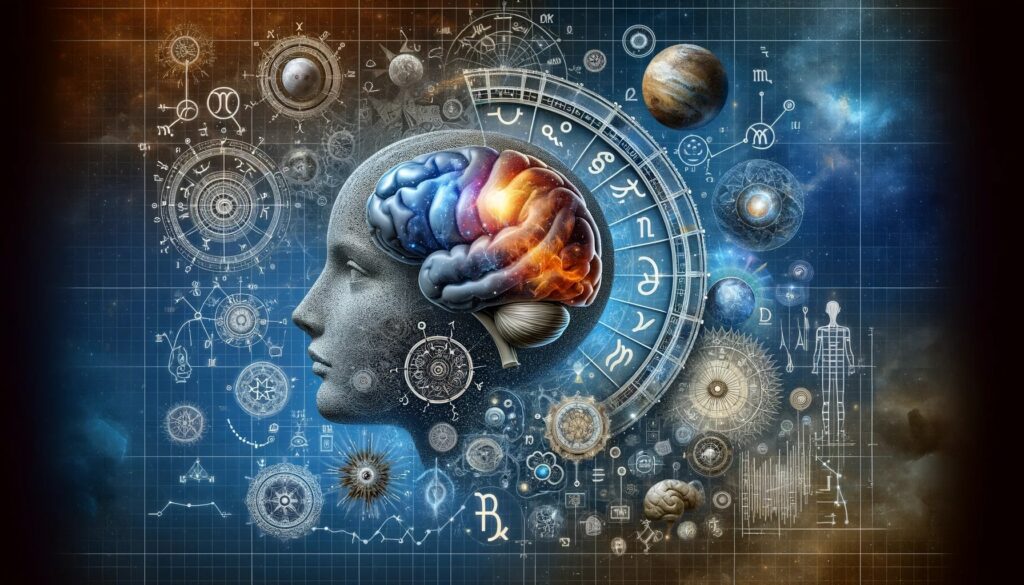Astrology, a field steeped in ancient wisdom, has intrigued minds for centuries, offering insights into the human psyche and personality. In “Astrological Influences on Personality: A Psychological Perspective,” we delve into the fascinating correlation between the positioning of celestial bodies and individual personality traits. This exploration bridges the gap between the mystical realm of astrology and the empirical world of psychology, presenting a unique viewpoint on how the stars may influence our behavioral patterns and character traits.
This exploration into the astrological influences on personality not only seeks to understand the individualistic traits shaped by the stars but also aims to foster a deeper appreciation of the diverse temperaments and behaviors in our society. By considering the celestial underpinnings of our personalities, we gain a more empathetic understanding of ourselves and those around us, bridging the gap between ancient astrological teachings and contemporary psychological thought.
Exploring the Connection Between Astrology and Personality
The quest to understand the influence of astrology on personality leads us down a path where celestial mechanics intersect with human characteristics. This connection, often dismissed by skeptics, holds a certain allure and potential for deeper self-awareness. By examining astrological influences, we can uncover layers of our personality, providing a new perspective on traits that define us and the decisions we make in life.
In exploring the connection between astrology and personality, we embark on a journey that intertwines fate with character, destiny with disposition. This inquiry does not just satisfy curiosity but also serves as a guide for personal introspection and understanding, offering a unique way to decipher the complexities of human nature through the age-old wisdom of the stars.
The Foundations of Astrological Psychology
Astrological psychology combines the symbolic language of astrology with the analytical approach of modern psychology. This fusion creates a framework for understanding the complexities of human behavior. By analyzing the positions of planets and zodiac signs at the time of birth, astrological psychology proposes a blueprint of psychological tendencies. This approach offers a unique lens through which individuals can examine their inherent traits, motivations, and potential life path.
Astrological psychology not only maps out the potential paths of our personality development but also provides a context for understanding the deeper motivations and conflicts we encounter. It serves as a compass, guiding us through the intricate labyrinth of our psyche, and revealing the layers influenced by celestial dynamics.
Astrology as a Tool for Self-Understanding
Astrology serves as a powerful tool for self-reflection and personal growth. By providing insights into inherent strengths and challenges, it enables individuals to navigate their life journey with greater awareness. Understanding one’s astrological makeup can lead to a deeper comprehension of personal interactions, career choices, and emotional responses. This celestial guidance, when used thoughtfully, can be a valuable asset in personal development and psychological well-being.
The Role of Planetary Positions in Shaping Character
In the study of astrological influences on personality, the positions of planets at the time of birth play a pivotal role. These planetary positions, as mapped out in an individual’s birth chart, are believed to have profound psychological impacts. Each planet, with its unique characteristics, influences different aspects of personality and behavior. Understanding these influences provides insight into the complex tapestry of human nature, offering explanations for individual differences and tendencies.
Planetary Aspects and Their Psychological Impacts
Planetary aspects, which are the angles planets form with one another, can significantly impact an individual’s psychological makeup. For instance, the position of Mars, the planet of action and desire, can influence an individual’s assertiveness and drive. A strong Mars aspect might result in a bold, ambitious character, whereas a weaker Mars could manifest as a more passive demeanor. Similarly, Venus influences aspects of love and beauty, impacting how individuals express affection and appreciate aesthetics. The interplay of these planetary aspects offers a nuanced view of personality, shaping characteristics and behaviors in subtle yet profound ways.
The Significance of Birth Charts in Personality Analysis
Birth charts, intricate maps of the sky at the moment of birth, are central to understanding astrological influences on personality. They provide a comprehensive overview of the positions and aspects of planets, offering insights into various facets of an individual’s character. The analysis of birth charts can reveal strengths, weaknesses, potential challenges, and opportunities. For example, a dominant Jupiter in a birth chart might indicate a naturally optimistic and expansive personality, while a prominent Saturn could suggest a more disciplined and cautious nature. By examining these celestial blueprints, individuals can gain deeper self-awareness and a better understanding of their place in the world.
**H2: Critically Evaluating Astrology in Modern Psychology**
The integration of astrology in modern psychology is a topic of robust debate and critical evaluation. While astrology has been a part of human culture for millennia, its place in the scientific realm of psychology is contested. This critical evaluation aims to understand the extent to which astrological influences on personality can be substantiated by empirical evidence. It involves scrutinizing the methods and claims of astrology, contrasting them with established psychological theories and research.
**H3: Debunking Myths and Misconceptions**
One of the primary challenges in integrating astrology with psychology is addressing the myths and misconceptions surrounding astrological practices. Critics often argue that astrology lacks the empirical support necessary for a scientific discipline, categorizing it as a pseudoscience. However, proponents suggest that astrology offers valuable insights into personality traits and human behavior, albeit in a more symbolic and interpretive manner. Debunking these myths involves a careful examination of astrological claims, assessing their validity and reliability, and distinguishing between anecdotal experiences and scientifically verifiable facts.
**H3: The Future of Astrology in Psychological Studies**
Looking ahead, the role of astrology in psychological studies continues to evolve. While traditional scientific communities largely remain skeptical, there’s a growing interest in exploring how astrological insights might complement psychological understanding. Future research might focus on empirical studies to explore correlations between astrological data and psychological traits, seeking to bridge the gap between these two fields. The potential for astrology to contribute to personality psychology, particularly in areas like narrative identity and symbolic self-expression, opens up intriguing possibilities for future exploration and integration.
Conclusion
The exploration of astrological influences on personality within the context of psychology offers a complex and multifaceted perspective on human behavior and individual differences. While astrology has its roots in ancient traditions and beliefs, its relevance in contemporary psychological discourse remains a topic of ongoing discussion and exploration. This conclusion seeks to summarize the key insights gained from this exploration and to reflect on the potential implications and applications of integrating astrological perspectives into the broader understanding of personality dynamics.
Integrating Astrological Insights for Personal Growth
The concept of using astrological insights for personal growth and self-awareness is one of the most compelling aspects of this exploration. By understanding the potential influences of celestial bodies on personality traits, individuals can gain a deeper understanding of their inherent strengths and challenges. This knowledge can be empowering, providing a framework for personal development, improved self-awareness, and more meaningful interpersonal relationships. While it’s important to approach astrology with a critical and discerning mindset, there is undeniable value in the introspection and self-reflection that it can inspire.
The Ongoing Debate: Astrology and Personality Dynamics
The debate surrounding astrology and its role in understanding personality dynamics continues to be a polarizing topic in both psychological and scientific communities. While skeptics point to the lack of empirical evidence and the potential for confirmation bias, proponents argue for the symbolic and interpretive value that astrology offers. This ongoing debate highlights the need for a balanced approach, one that acknowledges the limitations of astrology while also recognizing its potential contributions to a holistic understanding of personality. As research in psychology continues to evolve, it may find ways to incorporate astrological perspectives in a manner that complements established scientific understanding, enriching our insights into the complex tapestry of human personality.



